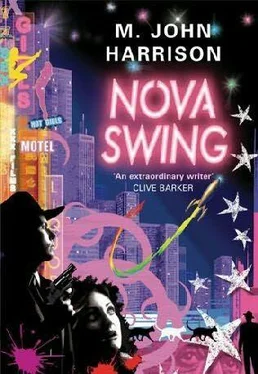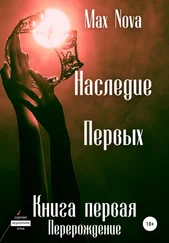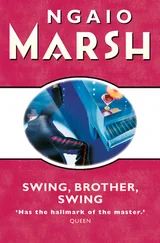Outside it was Saudade.
At one end you got the tall black and gold business towers and tourist hotels, with the lights coming on in them in angular cyphers; at the other, the pastels of the Corniche dimming in a sunset of impure hot pinks and greens. Between them the sea; and the horizon somewhere past the tremendous roll of the surf, like a crease in a piece of paper the colour of doves. Onshore winds, persistent as a hand on your arm, came up the streets from the front, picking up in transit the rich smells of seafood and low-end mixed drinks. The hotels were emptying, the bars were filling up, surf noir basslines were bumping out of every open door.
Vic Serotonin passed all this, his shoulders in a permanent shrug.
Vic was puzzled. He had a leather-bound diary in one pocket and a Chambers gun in the other.
He walked down Straint to its intersection with the top end of Neutrino, where two rickshaw girls and their clients were already in a traffic altercation, then turned left on to Cahuenga which brought him eventually to Hot Walls. After that, he was five minutes finding the right door. It was one of those tall narrow town-houses, six floors split into apartments. Vic rang the bell. There was a long wait, during which he rang the bell a couple of times more. Then an uncertain voice said:
"Who's there?"
"Remember me?" Vic said. "You want to see me. You want me to help you."
"Come in, Mr Serotonin."
He ran up the stairs two at a time.
Her diary had unsettled Vic, but he was unable to stop reading it. "I fear the unknown," she had written, "but the fear of the known is so much worse."
There were pages of this kind of thing. You got a list of expenses-a rickshaw downtown, meals at upscale venues like Els and Encientum, underwear from Uoest, clever books from Parker amp; Bright. Then a description of the fights-naphtha flares casting a kind of anti-illumination over the arena, burnt cinnamon smells, the cultivars strutting about, all tusks and tattoos, their erect cocks the size of horses', the sudden flash of an eight-inch spur then something slick and ropey levered out and steaming in the shadows. "There's a moral dimension here no one seems aware of," was her conclusion about the fights. That was fine. It barely scratched the surface, but it was more than understandable. It was the travelogue you'd expect. But then she was off again:
"The known is slicked on to everything like a kind of grease. You would do anything to avoid the things you already know."
It made her hard to place. She seemed like someone who had spent time in Saudade; then like someone who hadn't. But if she belonged somewhere else, no clues were left where that might be. You got the impression of a woman who'd depended on privilege one planet past what she could handle, and who had inevitably become lost in space. Other than eat and shop and take rides around town, she stayed home and got tense. She loved her apartment, she said, but her relationship with the city was partial, unconstructive. Despite that, she didn't just catch a ship out of there, which is what any tourist would have done.
"Am I meant to live this way?" she asked herself. "Is it the same for all these other creatures? Is that how they see things here?" Speaking as one of those creatures, Vic would like to know too.
But answers weren't forthcoming, and the diary's language was empty because its true object-her own anxiety-would always remain both present and unstated: so that every observation suggested more than it could ever contain. As a result even the physical object sometimes seemed packed and decodable. Pressed to the nose, its pages gave out the scents of midtown: coffee, perfume, polished wood. Then, very faintly, human sex. Vic couldn't imagine that. The words rose from among these smells as if they were sensations too: "I dream entirely in tiny mad paintings. A man seems to be spewing up a snake. Someone else is helping him. The roof of their house is on fire. They recoil from one another yet seem entwined, bent in the shapes of a body language which no longer has any meaning.
"Is this what will happen to me inside the site? Am I dreaming what it is like? I don't want to go in but I must." There being no attempt to explain this combination of need and paralysis, Vic was forced back repeatedly on to the entry which had first caught his eye. "Am I confused when I remember, or try to, the time before I was born?" Then, as if this weren't enough:
"The vast craneflies, libellulinae and locusts which somehow filled my life then were emblematic. They were alien species, icons of difference; as tentative and fearful as they were frightening. They were usually trying to speak, through the woman I knew as The Girl Beneath the Dragonfly. She was ^translating for them, caught up, electrified, pushed out of herself, taken over, by their need. She had no life of her own. She was a radio, a retro radio. She lay on the sodden black ash. She was myself. They stood over her, trembling. They were trying to explain through her how badly things had gone wrong. How they had been blown here by circumstances they could not control. How they didn't mean to be here. In a sense they were my parents, but they had never been meant to be here, in the world as we knew it then.
"Insect," she concluded, "is an anagram of incest."
Even for a childhood on another planet it seemed extreme.
At least he had learned her name, written repeatedly across the first two or three pages in a hand which, formless at first, soon became practised and fluent. It was Kielar. "Mrs Elizabeth Kielar," she had written again and again, like a girl trying out future identities from the safety of some expensive New Venusberg school. "Elizabeth Kielar. Mrs Kielar." Vic would never use it, but it was a name. She stood looking at him uncertainly from her doorway. The fur coat Irene had so admired was loosely slung over an oyster satin slip, which encouraged the hallway light to pool up blue shadows behind her thin collarbones.
"I'm sorry," she said. "I-"
"In the end," Vic said, "sorry's never enough."
He pushed past her and into the apartment. It was seven or eight rooms one after the other, the connecting doors open so you could see the length of it. A bank of identical windows ran all the way down on the left, lighting it like a single artfully divided space, a restaurant or a gallery. Vic could feel her standing behind him, pulling the coat closed across her breasts, watching him with that continuous bland puzzlement of hers. She smelled of Anai's Anai's, and also some expensive flowered soap.
"You knew that," he insisted, without looking back, "but until now you've never had to acknowledge it." He held up the diary. "Why give this to me?"
She shut the door quietly behind her.
"You're angry," she said. "I don't know why you're so angry."
"I can't work with uncertainties on this side."
"Would you like to have a drink?" This idea seemed to restore her. "I was asleep when you knocked," she said. "Please come in and have a drink."
"I want to know what you think I can give you," Vic said.
"It didn't work because you were so angry. I was more afraid of you than that place."
"Maybe that's how it seems to you now," Vic said.
In the end, though, what could he do but shrug? He followed her down the curious linear apartment, accepted a drink, sat at one end of a sofa with a green chenille cover thrown over it and watched while she arranged herself at the other, in the corner as far away from him as she could get. She drew up her knees. She allowed the fur coat to fall loosely around her, and watched Vic in return. Vic made a pantomime of placing her diary carefully on a small table, which was perhaps his way of saying that was over now, he'd just leave that alone. There was a single narrow glass vase on the same table. In the mornings the light would fall harshly across it, tangle the transparent shadow of the vase in the shadows of the window frame. "Is that the drink you like?" she asked him. "Is that the way you prefer it?"
Читать дальше












